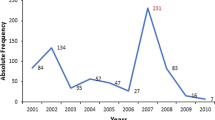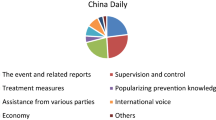Abstract
The formation of public opinion in different countries of the world is important for the formation of global media discourse, since ambiguous opinions are produced in the Asian media, it is worth investigating and studying the linguistic nature of journalistic methods of influencing the audience and the peculiarities of communication with readers. The study aimed to decipher the explicit and implicit linguistic techniques employed to construct political narratives in the media domains of China and Japan, while also examining existing research in the realm of media language. The methodological basis of the work is analytical-synthetic, comparative, contextual and lexical-semantic analysis, which were used in a complex. In this study, the peculiarities of the media discourse of China and Japan were determined based on the analysis of the objectivity of the depiction of events related to the war in Ukraine, and an idea was formed about the characteristics of the narratives that were laid at the level of explicit and implicit meanings, decoded using the study of linguistic means. Attention is focused on the contrast between the Chinese and Japanese positions regarding the war in Ukraine in the media discourse and the peculiarities of information coverage (neutrality or stylistic marking, the choice of lexical-semantic means, the level of artistic imagery). A contextual analysis of Chinese and Japanese online newspapers, which form the modern Asian media field, was carried out, which journalistic techniques are used and which linguistic means are used to achieve the basic communicative goal. This research can be used for further linguistic investigations regarding the formation of political narratives in different regions and countries of the world, in particular regarding the war in Ukraine, conducting a comparative analysis of the rhetoric of public opinion leaders and their influence on the general media discourse.
Similar content being viewed by others

References
War in Ukraine. 2022. BBC. https://www.bbc.com/news/world-60525350.
Getmanchuk, Alyona. 2021. Ukraine-Japan: how to secure an effective Global Partnership?. Kyiv: New Europe Center.
Hirano, Takashi. 2022. How Japan perceives Russia’s War Against Ukraine?. Kyiv: New Europe Center.
Horbachyk, Oksana, Olexandr Koziy. 2022. The position of the leading countries of Asia regarding the russian-ukrainian war of 2022, based on the example of Japan, South Korea, and the people’s Republic of China. Drohobych: Ivan Franko Drohobych State Pedagogical University.
Grimaldi, Cristian. 2022. Japan’s Tangled Territorial Dispute with Russia. The Diplomat. https://thediplomat.com/2022/05/japans-tangled-territorial-dispute-with-russia/.
Wu, Doreen, Ming Liu, and David Li. 2022. Media Language and Discourse in Cultural China. Amsterdam: John Benjamins Publishing Company.
Godement, François, Viviana Zhu. 2022. Ukraine: China’s Rock-Solid Pro-russia Narrative. Paris: Montaigne Institute.
Hughes Thomas, and John Graham Royde-Smith. 2022. World War IIhttps://goo.su/oCCUoYS.
Wei, Hu. 2022. Possible Outcomes of the Russo-Ukrainian War and China’s Choicehttps://uscnpm.org/2022/03/12/hu-wei-russia-ukraine-war-china-choice/.
Jing, Huang. 2022. The Opportunities, Challenges and Choices Brought to China by the Russian-Ukrainian Warhttp://archive.today/QnNYn.
Liqun, H. 2023. The Ukraine Crisis and the Collision of Three Security Conceptshttps://inf.news/en/news/7d10acf590e06130dd21eb621191f1ca.html.
Xinhua. 2023. https://english.news.cn/.
Pajon, and Céline, Eva Pejsova. 2022. Rapprochement in Times of Crisis: War in Ukraine and the EU-Japan Partnership. Brussel: Brussels School of Governance.
Pugliese, Giulio. 2022. Japan Responds to Russia’s War: Strong Solidarity with Ukraine with an Eye on Chinahttps://www.iai.it/sites/default/files/iaicom2211.pdf.
Ukraine latest: Liberated Kherson loses power supply after Russian shelling. 2022. Nikkei Asiahttps://asia.nikkei.com/Politics/Ukraine-war/Ukraine-war-Free-to-read/Ukraine-latest-Liberated-Kherson-loses-power-supply-after-Russian-shelling.
Taranenko, Olena. 2017. Overcoming euphemism in the language of war in the Ukrainian media and political discourse. SJS 883(1): 148–153.
Hairuo, Cai. 2022. and Liang Jun. Facts about Russia-Ukraine conflict: Kremlin says Russia remains open to negotiations with Ukraine. People’s Daily Online. http://en.people.cn/n3/2022/1109/c90000-10169008.html.
Wenxing, Zhong. 2022. and Du Mingming. Gas shortages, cold weather to deal blows to European companies, says economist. People’s Daily Online. http://en.people.cn/n3/2022/0920/c90000-10149224.html.
Arcibal, Cheryl. 2022. China is lone bright spot as world’s rich population shrinks amid slump in stock markets caused by Russia-Ukraine war. South China Morning Posthttps://goo.su/1YxOu.
Chaolan, Wu. 2022. and Liang Jun. China to join Vostok-2022 Russia with other countries; closer China-Russia ties crucial to defend global stability to counter US hegemony. People’s Daily Online. http://en.people.cn/n3/2022/0819/c90000-10137248.html.
Sheng, Yang. 2022. and Wan Hengyi. Xi’s key visit to C.Asia shows China’s strategic vision, charms SCO summit with hopes, opportunities and certainty. People’s Daily Onlinehttp://en.people.cn/n3/2022/0916/c90000-10147798.html.
Qi, Xijia. 2022. Europe faces coldest winter as energy crisis deepens, likely to prompt restructuring of global industrial chain. People’s Daily Online. http://en.people.cn/n3/2022/0824/c90000-10138983.html.
US an oligarchic republic masquerading as a democracy. 2022. Global Timeshttps://www.globaltimes.cn/page/202211/1278919.shtml.
Ukraine war: Russia digging in for. 2022. heaviest of battles in Kherson. South China Morning Post. https://www.scmp.com/news/world/europe/article/3197270/ukraine-war-russia-digging-heaviest-battles-kherson.
Jun, Liang. 2022. A bitter pill to swallow for Europe: locals gripped with severe energy crisis protest paying price for political games. People’s Daily Onlinehttp://en.people.cn/n3/2022/0907/c90000-10144277.html.
Qingqing, Chen, Chu Daye, and Bai Yunyi. 2022. Cloud of suspicion hangs over Europe on Nord Stream leaks, risks escalating Ukraine crisis, causing greater pains for Europeans amid energy crisis. People’s Daily Onlinehttp://en.people.cn/n3/2022/0929/c90000-10153134.html.
Russia leaves more of Ukraine without power in new strikes. 2022. The Asahi Shimbunhttps://www.asahi.com/ajw/articles/14746801.
Most Ukrainians left without power after new Russian strikes. 2022. The Mainishihttps://mainichi.jp/english/articles/20221124/p2g/00m/0in/015000c.
NATO promises to strengthen support for Ukraine Foreign Ministers’ Meeting, infrastructure attack. 2022. The Sankei News. https://www.sankei.com/article/20221130-HINPZM4IDZMLDLWK5IPSWADEGM/.
Prohorovs, Anatolijs. 2022. Russia’s War in Ukraine: consequences for European countries’ businesses and economies. Riga: RISEBA University of Applied Sciences.
Wang, Yihan, Elie Bouri, Zeeshan Fareed, and Yuhui Dai. 2022. Geopolitical risk and the systemic risk in the commodity markets under the war in Ukraine. Finance Research Letters 49, article number: 103066.
Smith, Sheila. 2022. The United States, Japan, and Taiwan: what has Russia’s Aggression Changed? National Bureau of Asian Research 17(2): 69–97.
Speck, Ulrich. 2016. The West’s response to the Ukraine Conflict a Transatlantic Success Story. Washington: Transatlantic Academy.
Nagy, Stephen, Phar Kim Beng. 2022. Ukraine-Russia War: a prelude to a post-western international order?. Stockholm: Institute for Security and Development Policy.
Pikulicka-Wilczewska, Agnieszka, Richard Sakwa. 2016. Ukraine and Russia people, politics, Propaganda and perspectives. Bristol: E-International Relations Publishing.
Turcsányi, Richard, Klára Dubravčíková, Kristina Kironska, Tao Wang, James Iocovozzi, Peter Gries, Veronika Vaseková, and Andrew Chubb. 2022. Chinese views of the world at the time of the Russia-Ukraine War. Olomouc: Palacky University Olomouc and CEIAS.
Brugier, Camille, Nicu Popescu. 2014. Ukraine: the view from China by Camille Brugier and Nicu Popescu. Paris: European Union Institute for Security Studies.
Kosovo conflict. 2022. https://www.britannica.com/event/Kosovo-conflict.
Instability in Iraq. 2022. https://www.cfr.org/global-conflict-tracker/conflict/political-instability-iraq.
Conflict in Syria. 2022. https://www.cfr.org/global-conflict-tracker/conflict/conflict-syria.
Dickinson, Peter. 2021. The 2008 Russo-Georgian War: Putin?s green light. https://www.atlanticcouncil.org/blogs/ukrainealert/the-2008-russo-georgian-war-putins-green-light/.
Dongxiao, ?hen, Da Wei, Cui Hongjian, Zhao Long, Wu Chunsi, and Yu Xiang. 2022. Russia-Ukraine Crisis: Where Do We Go from Here? Perspectives from Chinese Think Tanks. Shanghai: Shanghai Institutes for International Studies.
Carlson, Brian. 2022. Russia?s War in Ukraine: China?s Calculus. CSS Analyses in Security Policy 303: 1-4.
Wuthnow, Joel. 2022. Rightsizing Chinese Military Lessons from Ukraine. Washington: Institute for National Strategic Studies.
Daiske Oberb?umer, Leon, and Alexandra Sakaki. 2015. Japan?s Debate over Russia and the Ukraine Conflict. Berlin: German Institute for International Affairs and Security.
Ranglin Grissler, Jakob. 2022. How the War in Ukraine Could Changejapan?s Refugee Policies. https://www.researchgate.net/publication/361109143_How_the_War_in_Ukraine_Could_Change_Japan?s_Refugee_Policies.
Abhishek, Roy, and Paul Pompy. 2022. Indian Televisual News Discourse on the Russia-Ukraine War. https://discourseanalysis.net/sites/default/files/2022-10/Roy_2022_DNCWPS_8-2.pdf.
Carrier, ?. 2022. What Are the Different Types of Media Discourse?. https://www.languagehumanities.org/what-are-the-different-types-of-media-discourse.htm.
Author information
Authors and Affiliations
Corresponding author
Additional information
Publisher’s Note
Springer Nature remains neutral with regard to jurisdictional claims in published maps and institutional affiliations.
Rights and permissions
Springer Nature or its licensor (e.g. a society or other partner) holds exclusive rights to this article under a publishing agreement with the author(s) or other rightsholder(s); author self-archiving of the accepted manuscript version of this article is solely governed by the terms of such publishing agreement and applicable law.
About this article
Cite this article
Asadchykh, O., Poinar, L., Pereloma, T. et al. Russian Aggression against Ukraine in the Media Discourse of Asian Countries (Using the Example of China and Japan): Literature Review. Int J Semiot Law (2024). https://doi.org/10.1007/s11196-024-10114-6
Accepted:
Published:
DOI: https://doi.org/10.1007/s11196-024-10114-6



